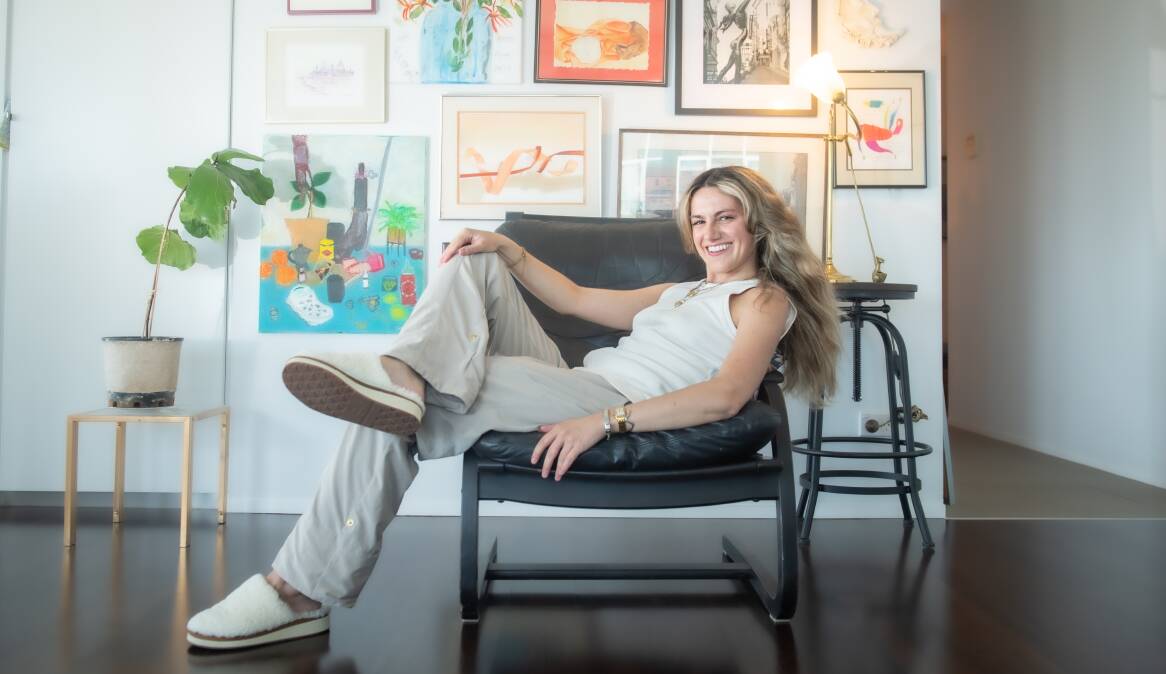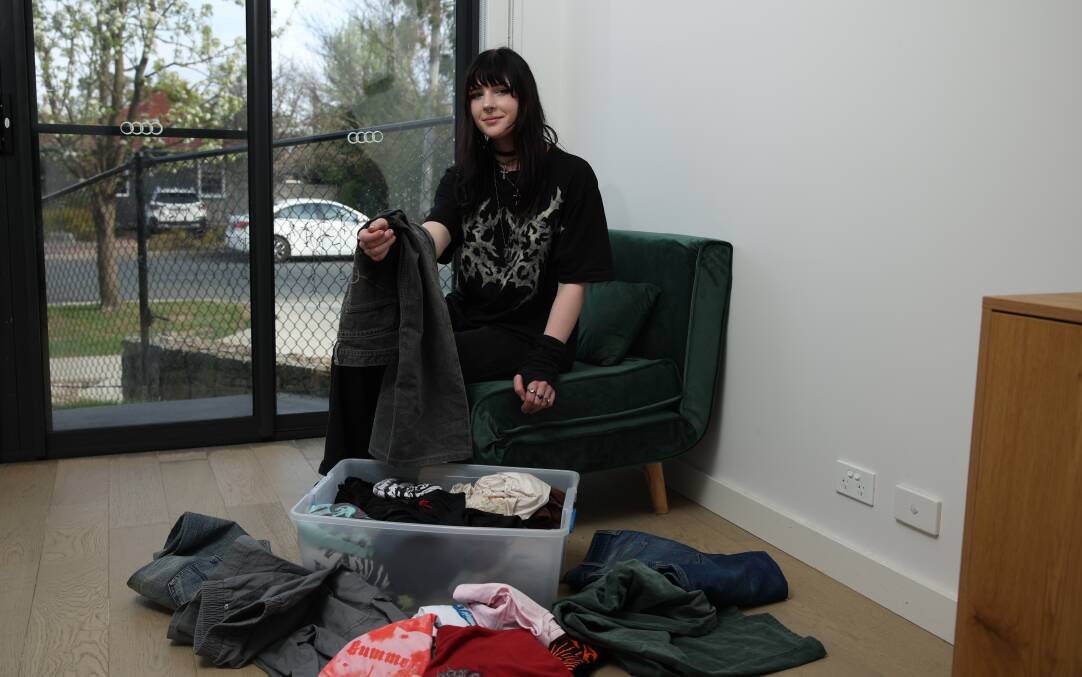It's increasingly looking like our grandchildren's version of thrifting will be to start digging ground until they unearth a big pile of clothes.
This image doesn't seem so wild when confronted with numbers like six tonnes (equivalent to an African elephant's weight) of Australian fashion waste is dumped in landfills every 10 minutes, analysis from Melbourne supply chain consultant TMX Global found.
Landfills are about to get bigger with new fast fashion app Temu's spring clothing line starting at $0.99.

Young people pressured to buy more
College student Siobhan Hall and her friends have been bombarded with Temu's friend referrals as shoppers are encouraged to share sign-up codes to get discounts.
"I've never downloaded the app," Hall says. "It's absolutely awful."

The 16-year-old says the quick turnaround of fashion trends and limited-time-only discounts, on fast fashion apps, promote overconsumption among young people.
"I've even experienced feeling like I need to get more clothes," Hall says. " And I think the impact is just gonna get bigger."
The teenager resorted to buying unique second-hand clothing on Depop, a peer-to-peer e-commerce app, eventually realising she too could sell her old clothes to free up closet space and avoid throwing them away.
The aspiring designer has sold about 130 items and uses the $1000 she's made so far to upcycle and tie-dye other items she plans to sell.
Renting instead of buying

TMX Global also found Millennials and Gen Z were bulk-buying garments in different sizes and styles. Analysis showed of the 347,200,000 garments bought, 65 per cent were sent to landfills.
The chief executive of luxury dress rental platform The Volte, Bernadette Oliver, said fast fashion brands were contributing to the issue with overproduction.
She wanted people to see clothing as an asset that should be treasured and shared as opposed to disposable items that end up in land waste. Additionally, she said cost-of-living pressures had forced many Australians into second jobs, and people could turn their wardrobes into sources of income.
Volte users renting out their designer frocks online had earned thousands of dollars with 500 users earning between $50,000 and $100,000 a year by renting out their items.
"People get to utilise a dress that they would wear a couple of times. They might want to rent it out 15 or 16 times. We have had dresses that have been rented out 72 times," Ms Oliver says.
She said fast fashion brands needed to introduce different production models such as limited runs for certain styles that would increase demand.
"People can rent them on the Volte if they can't buy them," Ms Oliver says. "The idea is rather than buy a copy of a beautiful designer by Shein, you can buy the real Zimmermann dress and earn income from it. We support fashion as an investment."
'Wishcycling clothes'
The other obvious option is to donate clothes to charity. However, this may not be as sustainable as it sounds.
While op-shops sells what they can, charities annually export 105,900 tonnes of used clothing to places like the Solomon Islands, Fiji, and Pakistan, the Australian Fashion Council's 2022 report said.
"We're essentially saying to these nations, it's your problem now," ethical fashion expert Rae Knopik says.
She said selling clothes on platforms like Depop and Facebook Marketplace is where people take individual responsibility for their own clothing.
"It allows you to add your clothing to that circular economy in a more realistic way rather than just saying 'I'm gonna wishcycle this away', give it to an op shop, hope that they can resell it, and if they can't, they'll give it to another country," she says.
What is sustainable fashion, really?
Ms Knopik said clothes that are not produced in a circular economy, are not genuinely sustainable.
A circular economy is the evolving journey of fabrics whose lives have no end.
"I can make a pair of leggings that's made of recycled plastics and call it sustainable. But it doesn't mean that it was ethically made," she says.
According to her, real ethical fashion is when the person making the clothes is paid a living wage and works in safe humane conditions. Moreover, when clothes are designed to be recycled again and again.
She said a cotton shirt with buttons, zippers and a polyester neckline is very hard to recycle. Single-sourced fabrics - 100 per cent cotton, linen, silk and even polyester - have the highest recyclability.
Ms Knopik founded award-winning fashion brand Gren, which she says is the way to a future without fashion waste.
The brand sells T-shirts and custom wear made from recycled cotton and when their customers are done using them (hopefully after 10 years or more), they send it back to Gren to be recycled again.
"We essentially have a custodianship of the T shirts from start to finish," Ms Knopik, also Gren's director of quality assurance and sustainability, says.
However, there's one statistic that keeps the Canberran up at night.
"There is enough clothing on the planet right now to dress the next six generations of the human race," she says. "This is why we do what we do."
To prevent filling further landfills with textiles, Ms Knopik said we needed to act urgently and at scale. She believes individuals must develop their own style, brands must adopt a circular economy, and governments must incentivise ethical production.
"When you have a really clearly defined personal style, what you feel good in, and the materials you like, you actually consume a lot less," she says.
She said her company's profit margin was low because they developed a majority of their recycling machinery.
"If you have government legislation saying every company needs to take responsibility for everything they create by 2030 ... the technology will proliferate and things will become cheaper," Ms Knopik says.
"It will change the ideals of companies because they have to do it right ... at the moment they can just choose to do it right and choosing to do it is very expensive."
ACT Minister for Recycling and Waste Reduction Chris Steele gave an update on Tuesday about the government's circular economy strategy.
He said the government had committed to tackling textile waste directly by the scoping of textile hubs and evaluating the charity bin trial underway at Mugger and Mitchell resource management centers for possible future expansion.
He added the strategy recognised the importance of advocating nationally for a consumer's right to repair, and a reformed packaging industry that designed to avoid waste.
"These are actions which we will continue to support where we can and advocate directly to the Commonwealth for them to undertake at the national level through regulatory actions needed to make a circular economy work effectively across the country," the minister said.
We've made it a whole lot easier for you to have your say. Our new comment platform requires only one log-in to access articles and to join the discussion on The Canberra Times website. Find out how to register so you can enjoy civil, friendly and engaging discussions. See our moderation policy here.







